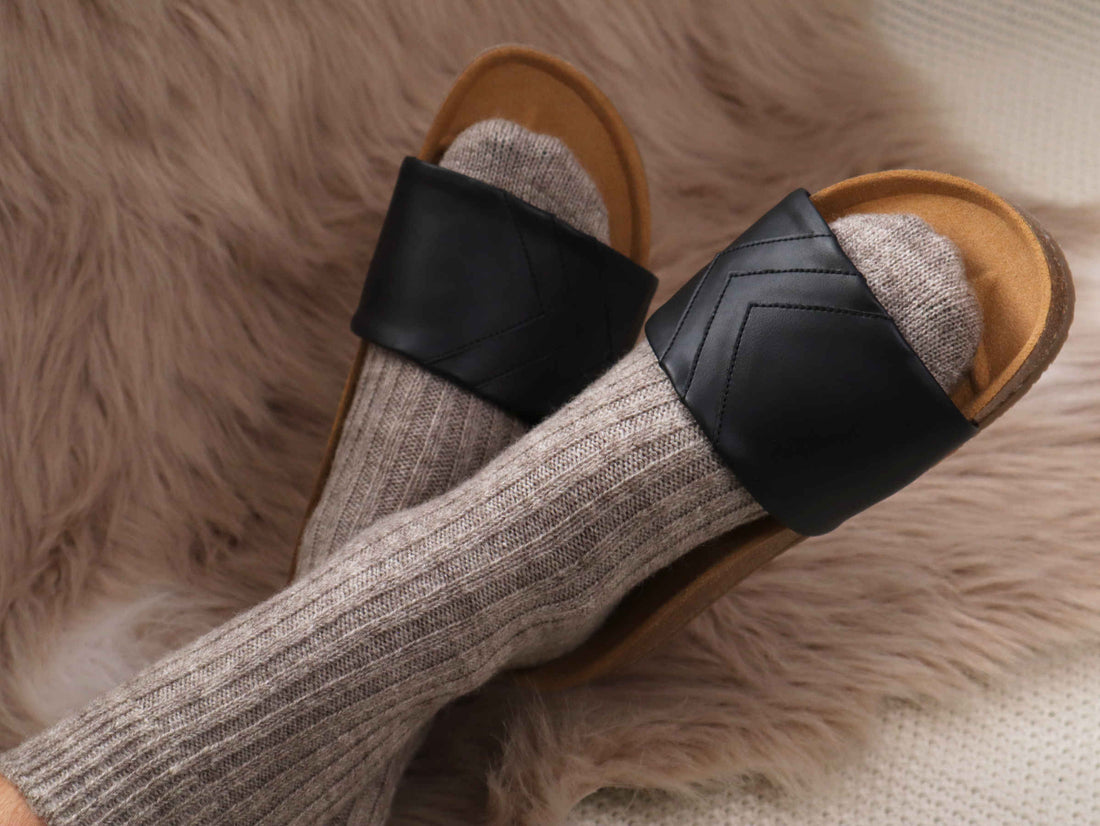- When Slippers Smell like Hell
- Main Causes of Stinky Slippers
- Practical Tips for Odor Prevention
- Long-term Solutions
- Summary
When Slippers Smell like Hell
Imagine coming home after a long day, ready for a relaxing evening. You slip into your favorite slippers, but suddenly there it is – that unpleasant smell tickling your nostrils. Stinky slippers are a ubiquitous problem many of us know all too well. It's not just embarrassing when guests are around, but also frustrating because you actually love your slippers for their comfort.
The problem intensifies when you consider how much we strain our feet daily. They carry us everywhere, squeezed into shoes where they can barely breathe. At home, we want to do something good for our feet and slip into our slippers – only to find that they have developed their own scent over time.
But why is that? Is it the sweat, the materials of the slippers, or maybe something else entirely? And more importantly: What can we do to keep our slippers fresh and inviting? In this article, we explore these questions. We look at the causes, explore materials and their properties, and give you practical tips on how to win the battle against stinky slippers.
Main Causes of Stinky Slippers
The sometimes nauseating smell of slippers is not a coincidence, but the result of a complex interaction between our feet, the materials of the slippers, and our environment. To understand and effectively address the problem, we need to grasp the underlying processes.
First of all, odors are volatile chemical compounds released by various sources and perceived by our noses as pleasant or unpleasant. With slippers, it's often bacteria breaking down sweat and releasing odor-intensive substances. Our feet are among the sweatiest parts of our body. Fun Fact: Our feet produce about a shot glass full of sweat per day. Although sweat itself is odorless, it provides a perfect environment for bacteria. These bacteria decompose the sweat, creating the unpleasant odors we know so well.
To effectively combat the problem of stinky slippers, it's important to understand the other main causes. Here are the key factors that, in combination with sweaty feet, lead to unpleasant odors in slippers or enhance them:
Lack of Ventilation: Many slippers are designed to provide warmth, often at the expense of ventilation. The low air circulation in the slippers ensures that sweat and moisture accumulate, promoting bacterial growth. However, warmth and good ventilation don't have to be mutually exclusive, as we will see shortly.
Material of the Slippers: Certain materials can contribute to odor development. Materials that absorb sweat and moisture without effectively evaporating them provide a breeding ground for bacteria. In contrast, some materials, like those used in Fünve slippers, are designed to effectively wick away moisture and minimize bad odors. We will show what materials these are and what to look for when choosing your slippers. By addressing these causes, we can develop strategies to keep our slippers fresh and odor-free. In the next section, we give practical tips for odor prevention and introduce how the right care and choice of slippers can solve the problem.
Practical Tips for Odor Prevention
To win the battle against stinky slippers, it's important to take targeted and effective measures. Here are some practical tips that help minimize the odor and keep your slippers fresh:Choice of the Right Material: Choosing shoes with the right materials makes a big difference and is more than half the battle. Natural materials such as cotton leather and cork soles effectively wick away moisture and are breathable while still being temperature regulating. In addition to the sustainable aspects, that is one of the reasons why we manufacture our sandals from exactly these materials.
Regular Cleaning: One of the most effective methods to combat odors is the regular cleaning of your slippers. Check the care instructions and wash them accordingly to remove sweat and bacteria.
Proper Drying: After cleaning, it is important to thoroughly dry the slippers. Moisture promotes bacterial growth, so the slippers should be dried in a well-ventilated environment or outdoors.
Use of Odor-Neutralizing Products: There are a variety of products such as shoe deodorants or foot powders that can help neutralize the odor. These products eliminate the bacteria or mask the smell. Better though if it doesn't arise in the first place.
Allow your Slippers to Rest: It is advisable to own more than one pair of slippers and to change them regularly. This allows the individual pairs to air out and prevents odor formation.
Long-term Solutions
Proper care is crucial for the longevity of your slippers. Regular wiping with a damp cloth and avoiding harsh cleaning agents help keep the slippers in good condition. Owning two pairs of slippers and wearing them alternately allows better ventilation and extends the lifespan of each pair.Investing in high-quality slippers can contribute to better foot health and less odor formation in the long run. Pay attention to materials and manufacturing quality to make the most of your purchase.
Summary
The main causes of stinky slippers lie in bacterial growth due to sweat, lack of ventilation, unsuitable materials, and insufficient care. To counteract this, it is recommended to regularly clean slippers, pay attention to breathable materials, and ideally wear two pairs of slippers alternately. Additionally, investing in high-quality slippers is an effective long-term strategy to ensure freshness and comfort.

